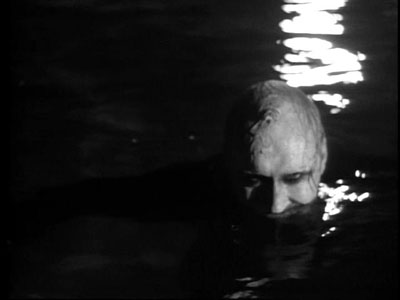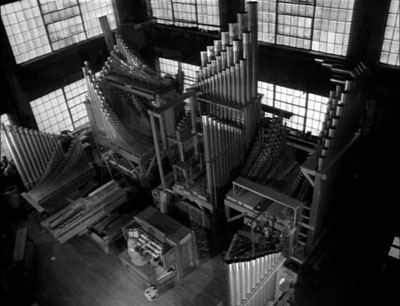
There is only one other movie that comes close to resembling Last Year at Marienbad. Last Year, directed by Alain Resnais in 1961 is about a man stuck reliving a memory differently as he tries to explain it to a girl (time and reliving mistakes, was Resnais great obsession). He's in love with this girl and tries to make her remember their time together. As he recalls it, he remembers the scene differently each time and soon the versions of the story begin overlapping. People drift from one evening to another, different clothes, same dialogue and events. All the while the man's pleading voiceover mixes with an almost perpetual organ score. The organ plays even when violins are played by musicians onscreen, making flesh the frustration at the heart of the story. It won the top prize at Cannes, and with good reason: there hadn't ever been anything like it. There is only one movie that has since come close to its haunting, dream-like, angst-ridden feel: Carnival of Souls.
 As far as markets, personnel and reception are concerned the films are as close as an orange and a buffalo, but, in the reels lie similarities strong enough to make someone mistake them for brothers (albeit one elegant, the other deformed and awkward). They both feature characters stuck in a world they cannot control, alienated by the forces closing in on them, trying to probe their mind for some meaning to their suffering. In Last Year the stranger has his thoughts twisted and doubted by the woman he loves. He tries desperately to make her see that she too, once, distantly loved him as passionately as he did. The memories are clouded by thoughts of her rejecting him in the past, present and future. Carnival of Souls follows a woman for whom every aspect of her life is uncertain: she survives a car accident in which, it seems, all of her friends have been killed. She moves to a strange place and is menaced by a spectral face everytime she is alone. The people in her everyday life are intimidating and make her feel uncomfortable to the point where she doesn't feel a part of the living world. Both films have people wandering in and out of time and space. Both have a haunting face that disrupts their mental stability (Herk Harvey, our strange shadowy auteur, in Carnival; Sacha Pitoëff in Marienbad) and leads them into the darkest realms of their soul. Both films would have had to have been labours of love for their directors: Herk Harvey made only one feature length film in his lifetime and Carnival of Souls is a very pronounced vision; I say the same of Resnais simply because Last Year at Marienbad is such a strange goddamned film. Who would spend the six weeks shooting the same scene ten or eleven times over, only to lose most of the footage on the cutting room floor and have a gothic whirlwind of anti-baroque moodiness to show for it? I hope for his sake that he knew what he was doing.
As far as markets, personnel and reception are concerned the films are as close as an orange and a buffalo, but, in the reels lie similarities strong enough to make someone mistake them for brothers (albeit one elegant, the other deformed and awkward). They both feature characters stuck in a world they cannot control, alienated by the forces closing in on them, trying to probe their mind for some meaning to their suffering. In Last Year the stranger has his thoughts twisted and doubted by the woman he loves. He tries desperately to make her see that she too, once, distantly loved him as passionately as he did. The memories are clouded by thoughts of her rejecting him in the past, present and future. Carnival of Souls follows a woman for whom every aspect of her life is uncertain: she survives a car accident in which, it seems, all of her friends have been killed. She moves to a strange place and is menaced by a spectral face everytime she is alone. The people in her everyday life are intimidating and make her feel uncomfortable to the point where she doesn't feel a part of the living world. Both films have people wandering in and out of time and space. Both have a haunting face that disrupts their mental stability (Herk Harvey, our strange shadowy auteur, in Carnival; Sacha Pitoëff in Marienbad) and leads them into the darkest realms of their soul. Both films would have had to have been labours of love for their directors: Herk Harvey made only one feature length film in his lifetime and Carnival of Souls is a very pronounced vision; I say the same of Resnais simply because Last Year at Marienbad is such a strange goddamned film. Who would spend the six weeks shooting the same scene ten or eleven times over, only to lose most of the footage on the cutting room floor and have a gothic whirlwind of anti-baroque moodiness to show for it? I hope for his sake that he knew what he was doing.The final thing that binds these films like split embryos in a womb is the soundtrack, oh yes, the soundtrack. The only music we get from either of these films is non-stop organ music. Wailing, noodling, aimless, screaming organ music from frame 1 to frame ∞. This can't be an accident. Harvey went so far as to make his heroine a church organ player; when's the last time you've seen a movie where someone goes out of their way to take a job as an organ player at a church no one is ever seen entering? Both of these men knew something and organ music was part of the plot. Personally, I like a violin or a tuba every now and again. Not these two. It's pipes or bust. Now of course Resnais had much else to represent his style and vision as a director (I highly suggest Hiroshima Mon Amour, it is the Frenchest movie of all time. And of course, a blinding masterpiece of eroticism and loss), but Harvey only had Carnival of Souls. This means that both men thought highly enough of the idea of gloomy tales of alienation to pour a hell of a lot of effort into making them. For all my jaw-clenching, these are original movies and were made by men with vision, which is more than most films can claim. Resnais was obviously rewarded more than Harvey (ed. Now both films share a Criterion DVD sleeve. Though Harvey beat Resnais to the punch by about four years).
 Personally, I can't decide which one I liked better on first visit. Last Year pulled ahead lately, but you have to admire the purity of obscure vision from both films. As far as motivating ideas and atmosphere go, Harvey and Resnais are just about even in my book. Composition: Resnais wins by a mile with his nods to the geometric avant-garde films of the 20s in the garden and every sweeping run over the exquisitely crafted, but soul-crushing hotel corridors. The images themselves say as much about the facile arrogance of the rich and so it is clear that Resnais had the more hyper-active brain. The shapes and contrasts, the beautiful shot of the hotel alone at night. He had ideas about relationships other artists have never touched and his movies are a testament to the wonderful mind he's still putting to use today. Harvey had some wonderful compositions and I can't help but wonder as to whether he was a misunderstood genius or a creepy amateur with a whole lot of luck. That Harvey achieves a number of truly awe-inspiring shots is to his credit, but his background gives me pause in my appraisal of him. I've seen his other work, as a maker of educational/safety shorts, and clever though they are, they aren't exactly early Kieslowski either. One can't deny that these are unique; those great expressionistic shots of the organ; the silhouettes outside the theme park; Candace Hilligoss's hair deserves special commendation for being so photographable; the dance of the ghosts; the walk through the empty town; the infamous face. He really makes a showing of himself. He, like Russ Meyer, is one of the few men who have provided people with something else to look at other than the thing they've paid to stand in front of the camera. Intention is another matter, but such is the burden of the cinephile. Our reward is to be able to bask in the wonderful enigma of a case such as this and have both texts at our fingertips.
Personally, I can't decide which one I liked better on first visit. Last Year pulled ahead lately, but you have to admire the purity of obscure vision from both films. As far as motivating ideas and atmosphere go, Harvey and Resnais are just about even in my book. Composition: Resnais wins by a mile with his nods to the geometric avant-garde films of the 20s in the garden and every sweeping run over the exquisitely crafted, but soul-crushing hotel corridors. The images themselves say as much about the facile arrogance of the rich and so it is clear that Resnais had the more hyper-active brain. The shapes and contrasts, the beautiful shot of the hotel alone at night. He had ideas about relationships other artists have never touched and his movies are a testament to the wonderful mind he's still putting to use today. Harvey had some wonderful compositions and I can't help but wonder as to whether he was a misunderstood genius or a creepy amateur with a whole lot of luck. That Harvey achieves a number of truly awe-inspiring shots is to his credit, but his background gives me pause in my appraisal of him. I've seen his other work, as a maker of educational/safety shorts, and clever though they are, they aren't exactly early Kieslowski either. One can't deny that these are unique; those great expressionistic shots of the organ; the silhouettes outside the theme park; Candace Hilligoss's hair deserves special commendation for being so photographable; the dance of the ghosts; the walk through the empty town; the infamous face. He really makes a showing of himself. He, like Russ Meyer, is one of the few men who have provided people with something else to look at other than the thing they've paid to stand in front of the camera. Intention is another matter, but such is the burden of the cinephile. Our reward is to be able to bask in the wonderful enigma of a case such as this and have both texts at our fingertips.
Both films undeniably served as an influence for The Shining. And for that we can all be thankful.

3 comments:
Amen!
Say why doesn't The Congregation have an organ like that one?
I know you'll jump on me for this but...
"a man stuck reliving a memory differently as he tries to explain it to a girl. He's in love with this girl and tries to make her remember their time together."
Ground Hog Day?
Groundhog day has no choice but to be considered the derivative. Marienbad was 1961, Groundhog Day 1991. Yes, the plot is similar however the devices, set pieces, humour is all very general and can be enjoyed. I meant only to say that there are no other movies that give you the same sensation as watching Marienbad or Carnival of Souls. I mean, memory and the passage of time and/or their role in relationships is certainly nothing unique anymore (Memento, Dark City, Mulholland Drive) but these films have other elements working for them that ground them in some sense. Marienbad is out there in its own dimension.
Post a Comment